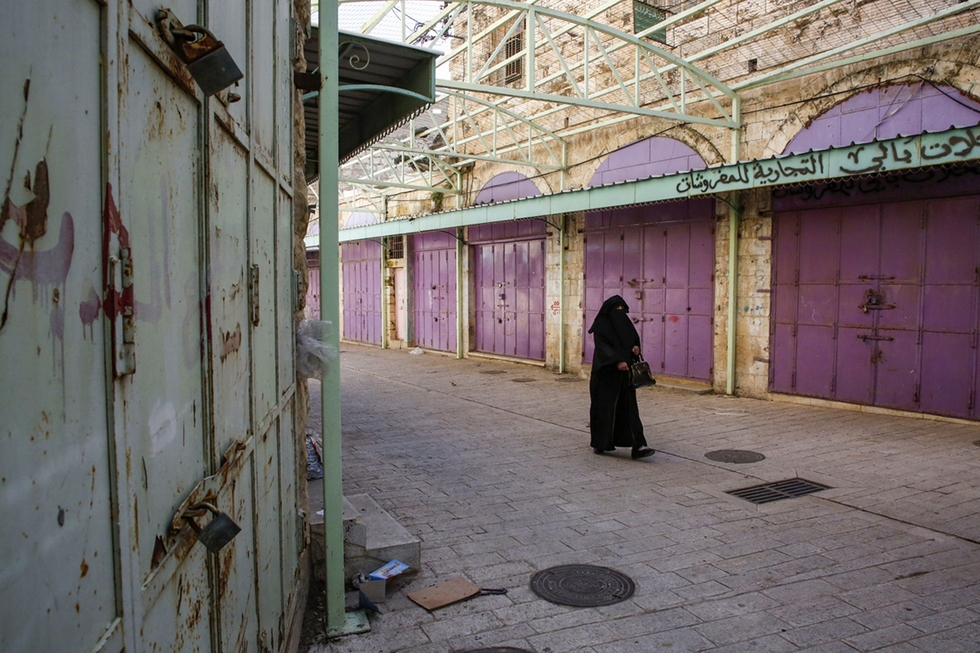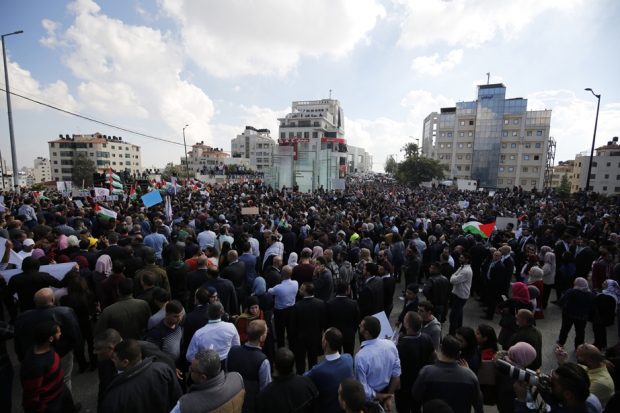Thousands strike in West Bank in protest over PA social security law

BETHLEHEM, Occupied West Bank - Thousands of Palestinians across the occupied West Bank demonstrated against the Palestinian Authority’s controversial social security law, amid fears that the fund will be mismanaged.
Shops and businesses in Bethlehem, Ramallah, Nablus and other major West Bank cities shut their doors on Tuesday, while hundreds of Palestinians protested in Ramallah, the PA's administrative hub.
“This strike is a way of telling the PA that most of the Palestinian people are against this law and refuse to abide by it,” said Muhammad Zghayyer, a spokesman for the committee of activists who organised the protests.
The minimum wage in Palestine is 1,450 shekels, just around $400 a month. People working on these wages can barely afford to pay for living expenses, let alone social security
- Muhammad Zghayyer, protest leader
“Despite 90 percent of the businesses, organisations, and universities across Palestine shutting their doors in protest, and constant demonstrations over the past few months, the government is refusing to listen to the people,” Zghayyer told Middle East Eye.
The fund is being paid for by worker contributions, with public sector employees paying in 10 percent of salaries on which many say they are already struggling to survive.
Many also fear the fund will be mismanaged, or could even be seized by Israel.
Sporadic protests have broken out against the law over the past few months, with several rallies taking place in Ramallah in November 2018.
Though the law has yet to be enacted on account of the protests and widespread discontent, Tuesday marked the first day Palestinian companies with more than 200 employees would have to register to join the Palestinian Social Security Corporation (PSSC), as dictated by the legislation.
The law, which Mahmoud Abbas enacted by presidential decree in 2016, sets the national retirement age for both men and women at 60.
Critically, it calls on private-sector employees to contribute just over seven percent of their monthly salaries, and for private-sector companies to make their own contribution of over 10 percent.
That money would then be allocated to a social security fund created by the PSSC and given back to the employees in the form of a retirement pension.
However, some elements of the law have proven contentious, such as a requirement for workers earning the minimum wage to also contribute to the social security fund.
“The minimum wage in Palestine is 1,450 shekels, just around $400 a month,” Zghayyer told MEE. “People working on these wages can barely afford to pay for living expenses, let alone social security.”
“If the government wants to enforce this social security law, they should raise the minimum wage,” he said.
Others have also raised concerns over whether the families of Palestinians killed by Israel would have access to their deceased relatives' retirement pensions.
Palestinian official Majed el-Helo, who oversees the social security programme, said "major amendments" have been introduced to the law to address the concerns of its critics.
He told Palestinian news agency Wafa that social security benefits will extend to the widows of pensioners after their death - no matter how the person dies.
He also said that the PA is working to offer low-interest loans from the social security programme to companies that meet certain criteria.
Fears funds will be mismanaged
However, Zghayyer said many Palestinians fear the PA won't uphold its end of the deal and actually distribute the pensions as promised.
"Social security is an important thing [for] citizens to protect their futures around the world," Zghayyer told MEE, "but when there is no trust between a citizen and his government, like in Palestine, these laws cannot work."
Citing rampant corruption within the PA, and Israel’s policy of withholding PA tax funds, Zghayyer said that he doesn't trust the government to protect the funds.
“What would happen if the Israeli occupation decided that the PSCC money supports 'terrorists', and decided somehow to seize control of the funds?” he asked.
"Who can promise to protect this money? The PA most certainly cannot."
Social security is an important thing citizens to protect their futures around the world, but when there is no trust between a citizen and his government, like in Palestine, these laws cannot work
- Muhammad Zghayyer, spokesman for committee organising the protests
Zghayyer told MEE that he and other activists have received death threats from people calling from anonymous telephone numbers since they began protesting against the law.
“Many of my fellow activists, and myself included, were personally sent threatening messages to our phones,” he said.
“Even my father was threatened, saying we will kill your son if he keeps working against this law.”
Despite this, Zghayyer said people will continue to protest until their demands are met.
"The workers are the ones who build up a country and help a government survive,” he said, “without the support of the workers, a government is nothing."
New MEE newsletter: Jerusalem Dispatch
Sign up to get the latest insights and analysis on Israel-Palestine, alongside Turkey Unpacked and other MEE newsletters
Middle East Eye delivers independent and unrivalled coverage and analysis of the Middle East, North Africa and beyond. To learn more about republishing this content and the associated fees, please fill out this form. More about MEE can be found here.





